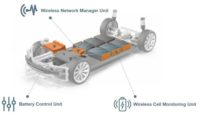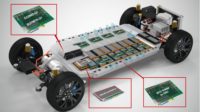DETROIT—Visteon Corp. has unveiled a wireless battery management system (BMS) to monitor battery packs continuously. It reduces battery failure and maximizes performance, reliability and longevity.
The system is customizable and scalable for multiple electric vehicle platforms, but its first application will be in electric vehicles mass-produced by General Motors. GM will make the system standard on all EV models powered by its Ultium batteries.
“Our wireless BMS technology eliminates wiring harnesses found in the battery packs of traditional systems, delivering…a secure, safe and robust battery system for EVs,” says Sachin Lawande, president and CEO of Visteon.
“The ground-breaking system, built in tandem with GM and other collaborators, provides a platform to deliver high battery cell measurement accuracy for the lifetime of a vehicle, along with maximum energy use per cell required for better vehicle range,” claims Lawande. “Additionally, this new wireless system can support safe and sustainable zero-cobalt battery chemistries, such as lithium-iron phosphate, which are important factors in sustainability efforts for automakers.
“The modular solution supports multiple charging protocols and is intended to meet OEM cost, weight and packaging requirements,” Lawande points out. “[This] holistic wireless BMS improves time-to-market, design flexibility, battery pack energy density and speed of manufacturing.”
“[It] keeps a constant eye on battery health and operation, helping automakers enhance vehicle and passenger safety, and improving overall quality and reliability,” says Lawande. “The technology is another milestone in the development of EVs as the industry transitions to cleaner transportation.”
“Agility is the key to maintaining [our] leadership position in EVs,” adds Kent Helfrich, executive director for global electrification and battery systems at GM. “While we have vertically integrated many crucial EV components, it still makes sense for us to partner with companies like Visteon to accelerate our vision for battery technology.”
Helfrich believes the wireless BMS will enable GM to get its EVs to market faster, because time won’t be needed to develop specific communications systems or redesign complex wiring schemes for each new vehicle. “Instead, the wireless system will help to ensure the scalability of Ultium batteries across [our] future lineup, encompassing different brands and vehicle segments, from heavy-duty trucks to performance vehicles,” he explains.
“Because the integrated hardware architecture and system software can extend across multiple vehicle platforms with minimal module configuration changes, this flexible wireless solution reduces engineering costs significantly and can more easily be integrated with thermal management systems and other vehicle controls,” claims Helfrich.
Other automotive suppliers, such as Texas Instruments, are also developing wireless battery management systems. Click here to learn more.






